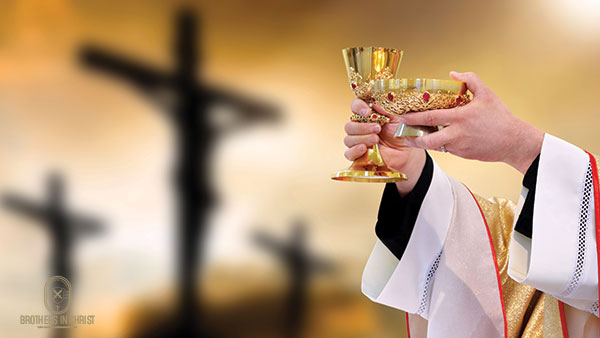
The Eucarist
The Eucharist, also known as Holy Communion, is a central element of Catholic worship, symbolizing the sacrificial love of Christ and His enduring presence within the Church. Rooted deeply in Catholic doctrine and tradition, the Eucharist holds profound theological, spiritual, and liturgical significance. For Catholics, the Eucharist is more than a mere symbol; it is believed to be the real presence of Jesus Christ, making it one of the most sacred mysteries of the Catholic faith.
The Theological Foundation: Transubstantiation
At the heart of Catholic teaching on the Eucharist is the doctrine of transubstantiation, a theological term used to describe the process by which the bread and wine become the actual Body and Blood of Jesus Christ during the Mass. According to Catholic doctrine, this transformation occurs during the Consecration, the pivotal moment of the Mass when the priest prays the words of Jesus at the Last Supper: "This is my body… This is my blood."
The concept of transubstantiation is drawn from Aristotelian philosophy and was formally articulated by St. Thomas Aquinas. Aquinas used the distinction between "substance" (what something is in its essence) and "accidents" (the properties perceivable by the senses) to explain that, while the bread and wine retain the appearance, taste, and texture of bread and wine, their essence is changed into the Body and Blood of Christ.
Scriptural Roots of the Eucharist
The Eucharist is deeply rooted in Scripture. It originates from the Last Supper, an event recorded in the Gospels where Jesus shares bread and wine with His disciples, instructing them to "Do this in memory of me" (Luke 22:19). In John 6:51-58, known as the "Bread of Life Discourse," Jesus speaks of giving His flesh and blood as spiritual nourishment. These verses are interpreted by Catholics as literal rather than symbolic, emphasizing the necessity of partaking in the Eucharist for eternal life.
St. Paul’s First Letter to the Corinthians (1 Corinthians 11:23-26) further highlights the importance of the Eucharist, as he describes the tradition of the Last Supper passed down to him and warns the community against taking the sacrament unworthily, underlining its sacred nature.
The Eucharist as Sacrifice and Thanksgiving
The word "Eucharist" comes from the Greek term eucharistia, meaning "thanksgiving." In the Eucharistic celebration, Catholics give thanks for Christ’s sacrifice, which is both recalled and made present in the Mass. The Eucharist is not only a commemoration of the Last Supper but is also believed to be a re-presentation of Christ's sacrifice on Calvary. This is not to say that Christ is sacrificed anew; rather, His one-time sacrifice is made present and effective for believers each time the Eucharist is celebrated.
In Catholic theology, the Eucharist is one of the seven sacraments, but it is also considered the "source and summit" of the Christian life, as articulated in the Second Vatican Council’s Lumen Gentium. This title emphasizes its central role in nourishing the spiritual life of the faithful and uniting them with Christ and one another.
The Eucharist and Catholic Worship
The Mass, the ritual in which the Eucharist is consecrated and received, is the highest form of worship in the Catholic Church. It is divided into two main parts: the Liturgy of the Word and the Liturgy of the Eucharist. In the Liturgy of the Word, Scripture is read, and the homily explains the readings, creating a foundation for understanding the sacrament. In the Liturgy of the Eucharist, bread and wine are offered, consecrated, and then distributed to the faithful as Communion.
Receiving Communion is both a personal and communal act. It is a moment of intimate union with Christ, as the Catholic Catechism teaches, and also symbolizes unity with the Church, the Body of Christ. Only Catholics in a state of grace may receive Communion, as it is a sign of faith and communion with Church teachings. Catholics prepare themselves spiritually for Communion through prayer, reflection, and often the Sacrament of Reconciliation.
The Real Presence: Adoration and Devotion
Belief in the Real Presence of Christ in the Eucharist has inspired various forms of Eucharistic devotion beyond the Mass. One of the most popular practices is Eucharistic adoration, where the consecrated host, displayed in a vessel called a monstrance, is placed on the altar for prayer and contemplation. Adoration offers Catholics a way to spend time in the presence of Christ, deepening their relationship with Him through silent prayer.
Another form of devotion is Benediction, a ritual in which the priest blesses the congregation with the monstrance. Additionally, many churches observe Corpus Christi, a feast celebrating the Body of Christ, with Eucharistic processions through the streets to publicly honor and share the mystery of the Eucharist.
Contemporary Challenges and Renewed Interest
In recent years, surveys have shown that belief in the Real Presence has declined among Catholics, with many viewing the Eucharist as a symbolic act rather than the literal Body and Blood of Christ. This decline has led Church leaders to encourage renewed catechesis on the meaning of the Eucharist, emphasizing its central role in Catholic spirituality and identity. Initiatives such as the Eucharistic Revival seek to reignite devotion to the Eucharist, particularly among younger generations, through education, adoration, and special liturgical events.
Conclusion: The Eucharist as the Heart of Catholic Faith
For Catholics, the Eucharist is more than a ritual or symbol; it is an encounter with Christ Himself, the source of grace, unity, and strength for the journey of faith. Through the mystery of the Eucharist, Catholics are called to deepen their relationship with Christ, live out His command to love, and bear witness to the transformative power of His presence. The Eucharist embodies the essence of Catholic faith—Christ’s love, sacrifice, and promise of eternal life—making it the most treasured and profound aspect of Catholic worship.

